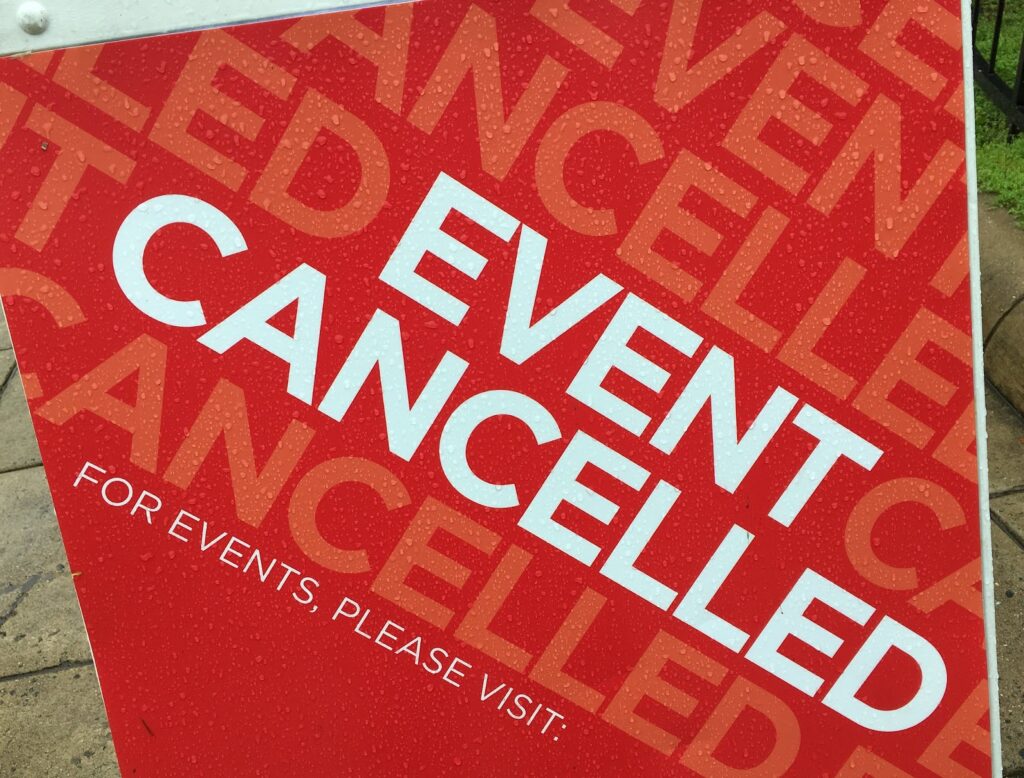
Global Challenges and Their Impact on the Events Industry in 2025
The capacity of the event sector to shift and tailor itself to fit into the last innovations has perpetually been one of its key characters.
However, in the past few years certain crises have come up to highlight the vulnerabilities of exclusively holding in-person events.
The COVID-19 pandemic without a doubt forced event organizers to rethink their event formulas and embrace virtual or hybrid solutions to prioritize health and safety measures.
This rare disruption transformed the way events are planned and audiences interact but also highlighted the importance of thinking on your feet in the face of global crises.
Much like a race car driver taking a detour, we all had to think fast and find new ways to stay in touch.
It basically resulted in everyone adopting Zoom as their go-to online events solution though Skype and WebEx had always been there.
Evolving Challenges for the Events Industry
As we head into 2025, the events industry faces a new wave of challenges that demand innovative solutions to minimize the impact on the events Industry.
Emerging disease outbreaks, such as localized epidemics, continue to pose risks to in-person gatherings, requiring contingency plans to be on top of the situation..
Climate change is another pressing issue, with extreme weather events disrupting outdoor venues and increasing the need for sustainable practices.
Rising temperatures and unpredictable weather phenomenon such as heat waves have made it essential for organizers to adjust time and resources for climate-resilient infrastructure and green event tactics.
Additionally, geopolitical tensions and economic risks are impacting budgets, air travel planning, and attendee participation.
Event planners are not only faced with unstable price fluctuations, visa restrictions, and quickly changing viewer desires, they also need to create an unforgettable moment.
To get ahead and live to fight another day in an ever-changing market, event organizers must adopt a proactive approach.
This implies taking advantage of virtual events technology and prioritizing sustainability for climate goals.
By learning from past disruptions and remaining aware of emerging trends, organizers can continue to adapt and innovate, ensuring minimum impact on the events industry.
In 2025, considering challenges in your event planning will define their success, making adaptability the cornerstone of the industry’s future.
Lessons Learned from COVID-19’s Impact on Events
The COVID-19 pandemic had a monumental impact on the events industry, forcing a quick change in how events are planned, executed, and experienced.
One of the most integral shifts was the widespread adoption of virtual and hybrid event formats.
Owing to the ban on live meetings and an emphasis on social distancing, event organizers turned to digital platforms to keep audiences engaged and avoid bankruptcy.
This shift not only guaranteed the continuity in the crisis but also proved that virtual events can be the best option to reach people from other parts of the world, spare costs, and make participation more flexible.
Today, hybrid events —that is part in person and part online— have become a standard, offering attendees the choice to engage on their terms.
The pandemic also shaped attendee expectations that remain in place even now, placing a heightened emphasis on health and safety.
The wide-spread adoption of QRcodes is only one. From contactless entry , better sanitation, and socially distanced seating, event organizers had to prioritize attendee well-being.
These protocols have since become a baseline expectation, with many attendees now valuing transparency about safety measures as much as the event content itself.
Beyond formats and safety, COVID-19 left a lasting impact on event planning and risk management.
The crisis underscored the importance of having robust contingency plans in place.
Organizers now actively take into account potential disruptions, from health crises and travel restrictions to supply chain issues.
Flexible contracts, comprehensive insurance policies, and backup plans for virtual pivots have become essential components of event planning.
Today, event organizers are better suited to steer through future problems with technology that has passed the test, more trust in science, and structural resilience built into the events industry.
The pandemic may have disrupted the events industry, but the lessons learned from the pandemic have permanently altered its approach to risk and innovation.
Emerging Global Challenges for the Events Industry
As the events industry looks to the future, it faces multiple emerging global challenges that will reshape how gatherings are planned and hosted.
The list of disruptive incidents likely to appear in the future include but are not limited to health crises, climate change, and economic instability.
The threat of new flu outbreaks looms large, with the expectation that localized epidemics and global health concerns would affect travel and in-person gatherings.
In such cases, event coordinators need to have health as their main concern.
For example, they could give out more hand sanitizers, offer testing and require vaccines as part of their event safety protocols.
For international events, travel restrictions and public health advisories can be disruptive, making it essential to have hybrid or fully virtual formats, to maintain engagement and participation.
Climate change’s growing impact on the events industry is another challenge which casts a dark shadow. Extreme weather events—such as heatwaves, hurricanes, and flooding—are making it tricky to schedule events, damage venues, and complicate logistics.
In the absence of proper weather precautions, open-space events become the victims of extreme weather conditions, and ultimately require heavy investment in things like weather-resistant infrastructure and backup plans.
There is also mounting pressure to adopt sustainable practices and reduce carbon footprints.
Minimizing waste, and sourcing eco-friendly materials would go a long way in assisting global environmental goals and meet attendee expectations for greener events.
However, the economic instability, steered by soaring prices and the threat of inflation, is adding more pressure to the event budgets.
Organizers are forced to find ways to cut costs due to higher venue fees, and increased travel fees, all while facing the risk of sponsors pulling out of their commitment.
To adapt, many are focusing on cost-effective solutions, such as leveraging technology to streamline operations, negotiating flexible contracts, and prioritizing value-driven experiences to attract participants despite tighter financial situations.
By staying ahead of the curve, embracing technology, and building resilience into their strategies, the industry can continue to adapt to whatever curveball is thrown its way.
How These Challenges Influence Event Planning
Event planning is undergoing a fundamental revolution thanks to the evolving global challenges that show their face every now and then.
These range from health crises to climate change and economic instability, all testifying to increasing demands for flexibility, risk management that is more proactive, and a commitment to sustainability.
Contingency planning is the cornerstone of event management within the context of today's unpredictable environment.
Organizers are now building flexibility into every aspect of their events, from contracts with vendors to event formats.
Hybrid models are therefore used to provide a backup during disruptions of in-person gatherings.
Organizers are also adopting agile planning processes that enable them to pivot quickly in the face of unforeseen challenges, such as last-minute travel restrictions.
Event professionals are therefore increasingly using structured frameworks for evaluating potential risks, their likelihood and impact, and devising mitigating strategies.
They have health and safety in place, insurance against cancellations, and monitoring in real-time of risks due to weather changes or geopolitical conflict.
This way, organizers can minimize disruptions and protect both their attendees and investments.
Organizers are also trying to go green by reducing single-use plastics, sourcing locally and sustainably, and offsetting carbon emissions related to travel and energy use.
But apart from all the environmental benefits, such initiatives strike a chord with delegates, an increasing proportion of whom now expect at least a little greenery from events.
By doing so, event planners aren't just future-proofing events but also raising a higher bar of resilience and responsibility for the industry.
This way, during global uncertainties, events remain relevant, and the impact on the events industry is minimal.
The Rise of Technology in Crisis-Ready Event Management
Technology has become a critical enabler for the events industry, especially in navigating global challenges and ensuring crisis-ready event management.
From virtual platforms to AI-driven tools, technology advancements are equipping event organizers with the ability to adapt and innovate to deliver seamless experiences against all odds.
Virtual and hybrid event platforms have been indispensable in overcoming issues related to travel restrictions, health crises, and economic constraints.
These platforms allow organizers to hold events that transcend geographical boundaries, hence making them accessible to a global audience.
Advanced analytics also allows real-time insight into the behaviors of attendees, the level of engagement, and risks.
For example, using AI-powered tools, one could predict trends in attendance, optimize scheduling, and even suggest contingency measures based on historical data.
Everything from event calendar plugins to online registration systems, online event management tools have become quite indispensable for streamlining operations.
These tools help organizers manage schedules, track registrations, and automate communication with attendees.
For instance, an integrated event calendar plugin can provide real-time updates on session changes, cancellations, or venue shifts, ensuring attendees stay informed during crises.
Such tools not only enhance efficiency but also reduce the risk of miscommunication during critical moments.
Technology also plays the most crucial role in facilitating clear communications and maintaining strong attendee participation which reduces the impact on the events industry.
Mobile event apps, live chat features, and push notifications enable organizers to share real-time updates, address attendee concerns, and provide guidance during disruptions.
Besides that, interactive engagement through live polling, Q&A, or virtual networking keeps them well engaged-even when the event format has shifted to online or hybrid.
These technologies make sure that the experience of the attendee is seamless and connected, come what may.
By embracing technology, event professionals can build resiliency into their operations to make events agile, captivating, and crisis-ready.
As global challenges continue to evolve, the strategic use of technology will be key to sustaining the industry’s growth and relevance.
Adapting to Modern-Day Challenges
The events industry has proven its resilience by adapting to modern-day challenges with creativity and innovation.
From weather disruptions to health crises and economic constraints, more and more creative ways of ensuring events come off were being sought by event organizers.
Here are some real-world examples of how the industry is pivoting to meet these challenges head-on.
Climate change has been driving extreme weather events with increased impacts on outdoor events.
For example, days before opening, a music festival had been completely flooded.
Instead of canceling, organizers quickly relocated to an indoor venue, leveraging real-time communication tools to inform attendees and vendors of the changes.
In spite of all that, the event did take place with minimal disruption, thanks to a contingency and mobilization of logistics through technology. This is something important in adaptation for variable conditions arising out of climatic change.
Health crises, even smaller-scale ones like seasonal flu outbreaks, can significantly impact event attendance and safety.
A recent international conference in Asia responded to a flu outbreak by implementing enhanced health protocols, including on-site rapid testing, temperature checks, and providing attendees with personal hygiene kits.
Additionally, the event offered a virtual attendance option for those unable or unwilling to travel.
Besides, these measures ensured that in-person participants were safe while maintaining high engagement, showcasing how proactive health planning could minimize risks.
This economic instability and increased travel cost have made participation in events by attendees very difficult.
To cope, many organizers welcome hybrid formats to accommodate a smaller travel budget.
For example, global tech summits have seen a drop in in-person attendance due to inflation but this is offset by offering a robust virtual experience.
Since most of these events had turned into a venue for online content creators and tech journalists, the average consumer was more than happy to simply watch the livestream.
An online format that would allow streaming keynotes, breakout interactive sessions, and moderated chat for the remote participants' sake without financial burden for traveling.
This approach not only expanded the event’s reach but also ensured accessibility for a broader audience.
By prioritizing flexibility, health safety, and inclusivity, event organizers are not only overcoming obstacles but also setting new standards for success in an unpredictable world.
Conclusion: Preparing for the Future of Events with Resilience
The future of the events industry lies in its ability to remain flexible, resilient, and innovative in the face of ongoing global challenges.
From health crises and climate disruptions to economic instability, the industry must continue to adapt and evolve to ensure events remain impactful and accessible.
Flexibility has become a must rather than a luxury; event strategies are to be designed by agility so that organizers are capable of adapting fast and effectively when anything wrong happens suddenly.
The key to building this agility will be investing in the right tools and partnerships.
Equipped with robust event management platforms, virtual and hybrid technologies, and real-time communication tools, organizers can respond to challenges with confidence.
It works with reliable vendors, technology providers, and sustainability experts to help enhance its capability in creating seamless experiences even on unstable ground.
It allows event organizers to create resilient, inclusive, and forward-thinking experiences by embracing new technologies like AI-driven analytics, immersive virtual platforms, and sustainable practices.
These innovations ensure that events remain accessible to diverse audiences, regardless of external constraints like travel restrictions or economic pressures.
While the tech journalists find a new buzz word every few months to drive up clicks and our fascination with technological progress, the closest recent one related to events is metaverse.
Online multiplayer games have for a long time served as virtual hubs for people of various ages and backgrounds to join for community and adventure.
The game Fortnite took an innovative step of hosting virtual concerts with renowned artists such as Travis Scott and Ariana grande in such a creative event.
Adapting to ongoing challenges requires a mindset of continuous learning.
Lessons from past experiences, such as the COVID-19 pandemic, have made it crystal clear that proactive planning, contingency measures, and attendee-centric approaches are of utmost importance.
The reflections on such experiences will give the industry a better foothold for the future and a basis upon which events will thrive in the ever-changing world.
As the industry continues to evolve, event organizers are called upon to be proactive, embracing change and placing resiliency at the core of their strategies. This will afford them new opportunities to innovate and inspire.The future of events is bright for those who are willing to adapt, invest in the right tools, and lead with creativity and determination. In a volatile world, resilience is not just a strategy—it’s the key to have an impact on the events industry.
Recommended Posts

How to Create an Effective Event Marketing Plan from Scratch in 2025
December 22, 2025





